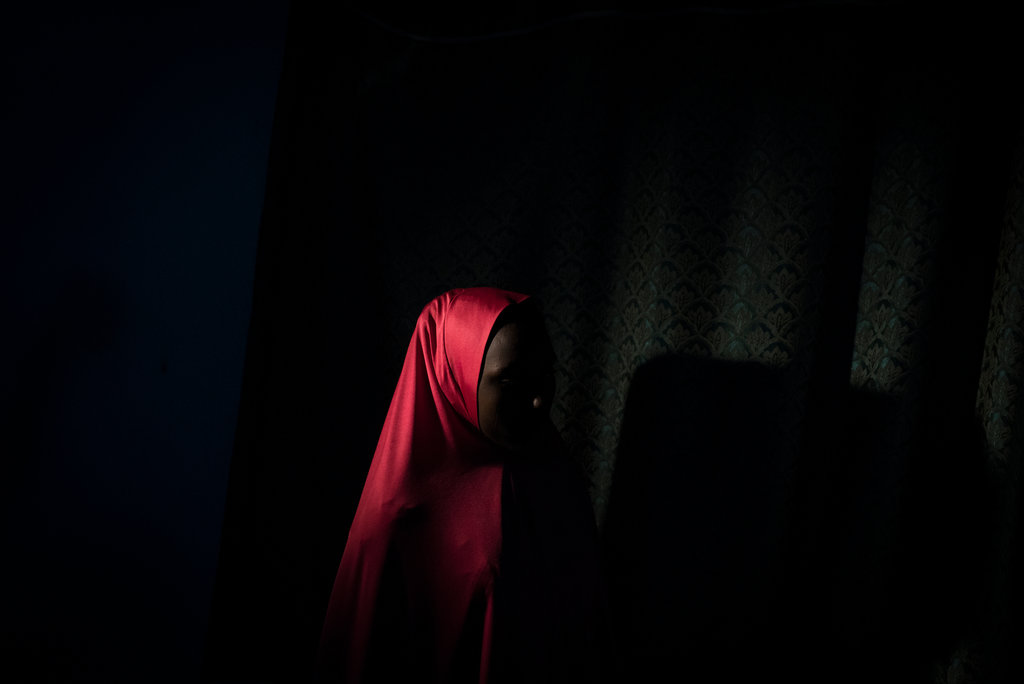Falmata a 14-year-old girl abducted from her home and raped repeatedly by Boko Haram’s fighters for the next three years.
She finally escaped last April, slipping into the bush while her captors slept. she made it to an IDP camp for victims of the war, and had just settled in for the night when she heard footsteps outside her tent. A security officer’s voice instructed her to come out. Frightened, she obeyed.
He took her to his quarters, she said, and raped her.
Hours later, after she had returned to her tent, another officer arrived, she said. He raped her, too.
“The same day I was brought there, soldiers started coming to rape me,” Falmata said. “They did it one after another. I’m not even sure those two knew about each other.”
“The soldiers would come and hold me so tight,” said another 13-year-old girl in an interview. She said she had been raped about 10 times this year at a camp in Maiduguri, before running away for her own safety.
“They were old enough to be my parents,” she said of the soldiers who raped her.
These horrific accounts were revealed in a report published by New York times Friday which revealed that Nigeria security officials had committed widespread rape against women and girls fleeing from Boko Haram.
Rape has been a defining horror of the war with Boko Haram, which has consumed northeastern Nigeria for eight years and spread beyond its borders. At least 7,000 women and girls have endured Boko Haram’s sexual violence, the United Nations estimates. Militants kidnap and rape young girls, teenagers and women, handing them out as so-called brides who are sometimes passed from fighter to fighter.
But Nigerian security forces have also raped victims of the war, preying on the people they are assigned to protect. Dozens of cases of rape, sexual violence and sexual exploitation were reported in seven camps in Borno State last year alone, carried out by guards, camp officials, security officers and members of civilian vigilante groups, the United Nations says.
In one camp, called Teachers Village, some residents said the security forces had worked out a system to select their victims. Young women were called to cook for them. After the women finished, security officers insisted that they clean up, telling them to go bathe in the officers’ quarters as the men watched.
“At first none of us knew they were doing this, but then the stories started to spread around camp that anyone cooking for them would be raped,” said Hadiza, 18.
After living in the camp for several weeks, Hadiza said, she was picked to cook for the officers. She was terrified.
“Definitely my time has come,” she recalled thinking.
Later, she was asked to serve water to four security officers in their room as they dined. One by one they left, she said, until only one man remained. He dragged her into a separate room and raped her, she said.
Hadiza was injured, she said, but didn’t ask for medical care, fearing that the officers would seek revenge. She said she tried to keep a low profile for a couple of weeks, but officers spotted her and raped her again. She said she had been raped as many as 20 times in the camp.
Once they identified you as a girl they wanted to have sex with, they would hardly leave you alone a single day,” Hadiza said.
By end of April, word of the rapes at Teachers Village camp had spread so widely across Maiduguri that people began showing up at the gates to look for missing relatives. Distant relatives arrived for Hadiza and took her away.
The police have arrested several men for sexually abusing and exploiting women and girls, according to the United States Embassy. The arrests, made last December, include two police officers, a prison warden, two civilian militia members, a civil servant and three soldiers.
But an Army Special Board of Inquiry said in June that allegations against its soldiers at the camps were unfounded, while Jimoh Moshood, a police spokesman, said the investigations were continuing.
Last year, President Muhammadu Buhari called for an investigation into sexual assaults at the camps after Human Rights Watch detailed the abuse in a report.
“Very little progress has been made by Nigerian authorities to implement President Buhari’s promise of justice for the survivors,” said Mausi Segun, the executive director of the Africa division of Human Rights Watch. “The delay reinforces displaced people’s sense of helplessness, and likely emboldens more perpetrators to prey on their vulnerability.”
At night, the camps are dimly lit. Aid workers come during the day, but typically not after sunset because of wartime curfews. Security forces tightly control who goes in and out of the camps, sometimes coercing women and girls to trade sex for food.
At checkpoints to enter Maiduguri, soldiers and militia members have turned away large groups of displaced people fleeing Boko Haram, unless they can pay an “entrance fee,” aid workers say.
People escaping with their herds are sometimes charged a fee for each animal. Those who can’t pay the bribes have been sent back into harm’s way.
Inside the camps, soldiers and members of civilian vigilante groups have been accused of forcing people to pay for the privilege of setting up tents or leaky shelters made of tarps and grass. Some displaced people told Amnesty International that they had to sell their belongings to survive, and when they ran out of things to sell, they had to have sex with soldiers and civilian militia members to get food.























Leave a comment